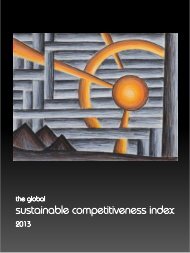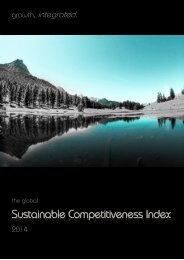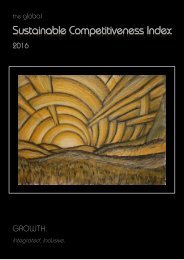The-Global-Sustainable-Competitiveness-Index-2015
You also want an ePaper? Increase the reach of your titles
YUMPU automatically turns print PDFs into web optimized ePapers that Google loves.
Summary<br />
<strong>Sustainable</strong><br />
Competitive<br />
Natural<br />
Capital<br />
Social<br />
Capital<br />
Intellectual<br />
Capital<br />
Resource<br />
Management<br />
Governance Spotlight Data<br />
Social<br />
Capaital<br />
Why are ideologies still dictating policy making?<br />
We are living 26 years after the fall of the Berlin Wall and the dissolution of the<br />
communist bloc - famously declared the end of history by Fukuyama in 1992,<br />
meaning the end of ideological controversies.<br />
Strangely, decision-making based on the theory of ideologies has not subsided<br />
since. On the contrary - controversial political debates nowadays seem to be<br />
even more based on ideologies and/or theories, rather than experiences:<br />
ideological thinking seems to be even more rigid these days. <strong>The</strong> debates and<br />
discussion on how to deal with the fall-out (let alone the cause) of the financial<br />
crises is marred by ideologically driven assumptions - in some circles, questioning<br />
the wisdom of the markets or asking the long-term cost of investment & spending<br />
cuts is akin to being a deep-red socialist, whereas the other side is also seem to<br />
be lacking a coherent recipe to really manage the changing realities with an<br />
over-focus on corporate bashing and the super-rich, relying on calls for solidarity<br />
to deal with the complexity of today’s World. Regardless of what side of the<br />
argument the policy is coming from – what is astonishing is the fact that in this<br />
modern world, policy decisions are based on ideologies rather than analytics<br />
that take into account the wider horizon and past experiences, both successful<br />
and unsuccessfully, to find workable efficient solution to whatever the challenge<br />
may be.<br />
<strong>The</strong> sustainable competitiveness research shows<br />
<br />
<br />
Unbelievable as it is, not a single lesson of 2007/2008 has been<br />
implemented. De-regulated financial markets where capital flows in and<br />
out, always to the promise of the highest possible short-term return, are a<br />
recipe for instability, ceaselessly absorbing huge resources to manage<br />
(let alone repair) the damage of bursting small and bigger bubbles<br />
caused by over-expectations and over-investments, constantly and<br />
negatively affecting all other markets (i.e. economic activities). A<br />
complete decoupling of financial markets and the productive economy<br />
is therefore required. Gambling is okay, as long as the bet is not the real<br />
economy. <strong>The</strong> financial markets in their current form are a threat to<br />
wealth creation.<br />
A sound industrial (productive and/or manufacturing) base is required for<br />
long-term development and sustainable wealth creation. This in term<br />
requires investments – in infrastructure, technology, R&D, innovation,<br />
efficiency, education. Of course, throwing money at something per se<br />
will not do. Investments have to be conducted and managed wisely,<br />
based on proper analysis that foresees all possible implications and sideeffects.<br />
<strong>Sustainable</strong> competitiveness analysis.<br />
Sometimes it is market tools that are most efficient, sometimes it’s incentives,<br />
sometimes regulations. Whatever works best – in most cases a combination of<br />
the above – should be applied. What we need is less ideology, and more<br />
pragmatism. We don’t need theories, we definitely need less ideologies - we<br />
need solutions that work. Analysis, scenario planning and experiences from the<br />
past, both successful and unsuccessful, should guide policy making, and not<br />
economic theories and ideologies.<br />
the sustainable competitiveness index <strong>2015</strong><br />
page 49








